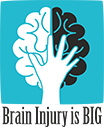empowering the severely brain injured and their families via support, understanding and a network of care
Physical effects
The brain co-ordinates the physical processes that are essential for a healthy life. These include breathing, hormonal balance, regulating blood pressure, the digestive system and body temperature regulation. Without these functions, our bodies would not operate correctly. The effect of a brain injury can cause irreparable damage to the brain’s ability to control these regular functions. Eventually, in severe cases, full-time carers may be required.
Spasticity. An injury to the brain can cause an abnormal increase in muscle tone called spasticity. Following a brain injury the onset of spasticity is rapid, beginning as early as one week following injury. A spastic muscle does not easily relax the way a normal muscle does. Often one side of the body is affected more than the other, depending on the area of the brain that is injured.
Regular stretching by the physiotherapists, splints fitted to keep limbs in proper position, and medications are common treatments, including pain management as severe spasticity can be painful.
Headaches are common following Traumatic Brain Injury. Some people have a headache all the time, and some people’s headaches come and go.
Fatigue is a common effect following a brain injury. The body needs a vast amount of energy for healing after a traumatic injury and sleep is often disrupted in the hospital. Usual patterns of rest and activity are often very different for many weeks to months following the injury. Confusion can also make fatigue worse.
Sensory. The brain is the centre for all five of our senses: sight, touch, taste, hearing, and smell. When the brain is injured, each of the senses is at risk of change.

There may be changes in vision, such as blurry vision, double vision, or sensitivity to light. Hearing changes, including muffled hearing or ringing in the ears (tinnitus), in one or both ears and changes in taste and smell. This could be a complete lack of taste and smell or an altered taste, such as a metallic flavour in the mouth.
Muscle movement originates in the brain and a traumatic brain injury can affect movement. Muscle weakness on only one side of the body is known as ‘hemiparesis’ and total paralysis of the arm, leg, and trunk on one side of the body is called ‘hemiplegia’. This is a condition, caused by a brain injury, that results in a varying degree of weakness, stiffness (spasticity) and lack of control in one side of the body. The definition comes from the Greek ‘hemi’ = half.
Incontinence. Even bowel and bladder functions are controlled by the brain. For many people bowel and bladder functions are impaired. Health care providers expect this and are prepared to help. Urinary catheters or urinary sheaths (convenes) can be used along with pads.
Epilepsy. Brain injury can make some people prone to epileptic seizures or ‘fits’. Many people who have had a seizure after a brain injury are given a drug for a number of years to reduce the chance of it recurring. The drug may have an overall ‘dampening’ effect on the person’s level of arousal. Remember the added effect that this could have if the person already has excessive tiredness.
Dysphagia after brain injury. Dysphagia is a medical term used to describe difficulties with chewing and swallowing. This is a common effect after a brain injury, particularly in the early stages when it would require management in hospital. In some cases, the condition can persist and will need to be managed in the long-term. The purpose of evaluating the person’s ability to swallow is to make sure that what he or she eats goes into the stomach, not into the lungs. When food or fluid slips into the lungs, it often results in pneumonia.
Dyspraxia (Apraxia) is a direct result of injury to the brain, often to the parietal lobe. People with Dyspraxia may have trouble using items correctly, for example trying to use a toothbrush to comb hair or a fork to eat soup. They may also be unable to follow spoken directions accurately. For example, he or she may not give “thumbs up” when asked.
Dysarthria. When a person sustains an injury to the brain, he or she may experience a variety of disabilities depending on the location and severity of the brain damage. In particular, damage to the motor control areas that affect the muscle movement of critical speech organs can create a serious speech disorder known as dysarthria. Without proper control over the parts of the body associated with speech, such as the vocal cords, jaw, and tongue, a person may not be able communicate verbally.



